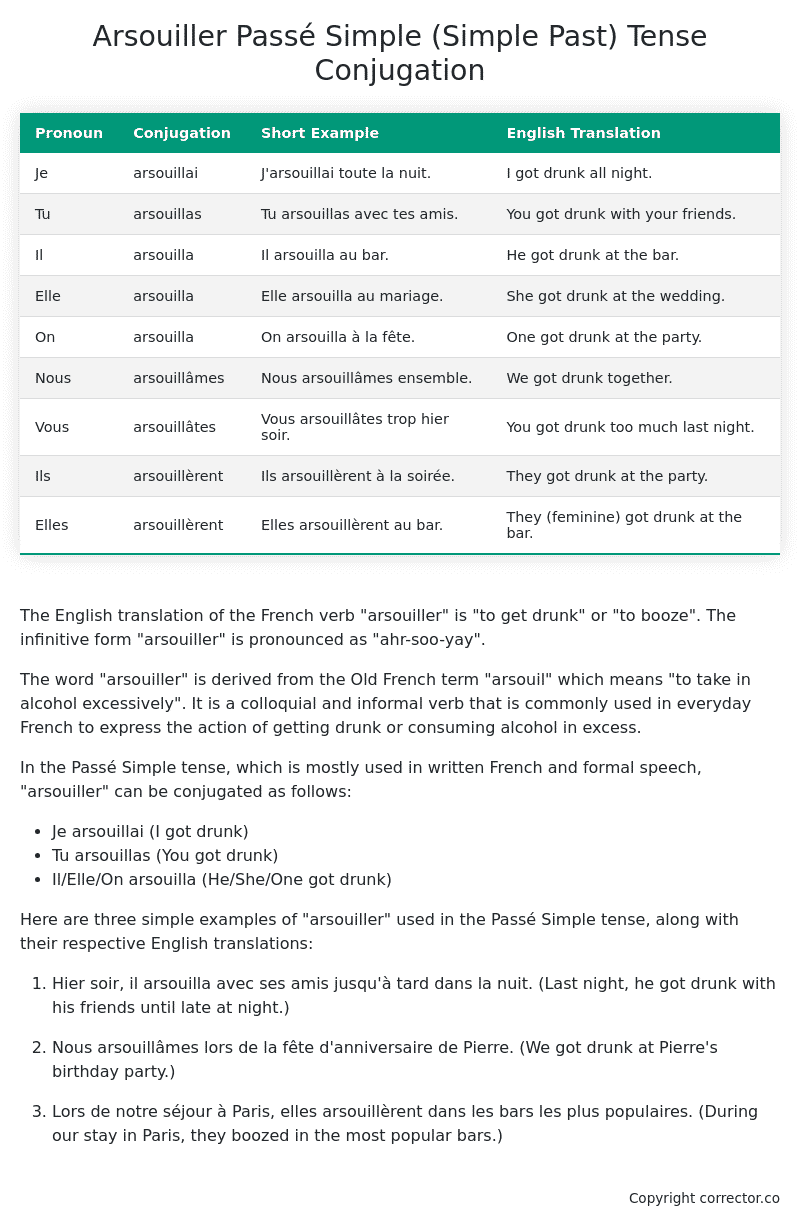Passé Simple (Simple Past) Tense Conjugation of the French Verb arsouiller
Introduction to the verb arsouiller
The English translation of the French verb “arsouiller” is “to get drunk” or “to booze”. The infinitive form “arsouiller” is pronounced as “ahr-soo-yay”.
The word “arsouiller” is derived from the Old French term “arsouil” which means “to take in alcohol excessively”. It is a colloquial and informal verb that is commonly used in everyday French to express the action of getting drunk or consuming alcohol in excess.
In the Passé Simple tense, which is mostly used in written French and formal speech, “arsouiller” can be conjugated as follows:
- Je arsouillai (I got drunk)
- Tu arsouillas (You got drunk)
- Il/Elle/On arsouilla (He/She/One got drunk)
Here are three simple examples of “arsouiller” used in the Passé Simple tense, along with their respective English translations:
-
Hier soir, il arsouilla avec ses amis jusqu’à tard dans la nuit.
(Last night, he got drunk with his friends until late at night.) -
Nous arsouillâmes lors de la fête d’anniversaire de Pierre.
(We got drunk at Pierre’s birthday party.) -
Lors de notre séjour à Paris, elles arsouillèrent dans les bars les plus populaires.
(During our stay in Paris, they boozed in the most popular bars.)
Table of the Passé Simple (Simple Past) Tense Conjugation of arsouiller
| Pronoun | Conjugation | Short Example | English Translation |
|---|---|---|---|
| Je | arsouillai | J’arsouillai toute la nuit. | I got drunk all night. |
| Tu | arsouillas | Tu arsouillas avec tes amis. | You got drunk with your friends. |
| Il | arsouilla | Il arsouilla au bar. | He got drunk at the bar. |
| Elle | arsouilla | Elle arsouilla au mariage. | She got drunk at the wedding. |
| On | arsouilla | On arsouilla à la fête. | One got drunk at the party. |
| Nous | arsouillâmes | Nous arsouillâmes ensemble. | We got drunk together. |
| Vous | arsouillâtes | Vous arsouillâtes trop hier soir. | You got drunk too much last night. |
| Ils | arsouillèrent | Ils arsouillèrent à la soirée. | They got drunk at the party. |
| Elles | arsouillèrent | Elles arsouillèrent au bar. | They (feminine) got drunk at the bar. |
Other Conjugations for Arsouiller.
Le Present (Present Tense) Conjugation of the French Verb arsouiller
Imparfait (Imperfect) Tense Conjugation of the French Verb arsouiller
Passé Simple (Simple Past) Tense Conjugation of the French Verb arsouiller (You’re reading it right now!)
Passé Composé (Present Perfect) Tense Conjugation of the French Verb arsouiller
Futur Simple (Simple Future) Tense Conjugation of the French Verb arsouiller
Futur Proche (Near Future) Tense Conjugation of the French Verb arsouiller
Plus-que-parfait (Pluperfect) Tense Conjugation of the French Verb arsouiller
Passé Antérieur (Past Anterior) Tense Conjugation of the French Verb arsouiller
Futur Antérieur (Future Anterior) Tense Conjugation of the French Verb arsouiller
Subjonctif Présent (Subjunctive Present) Tense Conjugation of the French Verb arsouiller
Subjonctif Passé (Subjunctive Past) Tense Conjugation of the French Verb arsouiller
Subjonctif Imparfait (Subjunctive Imperfect) Tense Conjugation of the French Verb arsouiller
Subjonctif Plus-que-parfait (Subjunctive Pluperfect) Tense Conjugation of the French Verb arsouiller
Conditionnel Présent (Conditional Present) Tense Conjugation of the French Verb arsouiller
Conditionnel Passé (Conditional Past) Tense Conjugation of the French Verb arsouiller
Conditionnel Passé II (Conditional Past II) Tense Conjugation of the French Verb arsouiller
L’impératif Présent (Imperative Present) Tense Conjugation of the French Verb arsouiller
L’impératif Passé (Imperative Past) Tense Conjugation of the French Verb arsouiller
L’infinitif Présent (Infinitive Present) Tense Conjugation of the French Verb arsouiller
L’infinitif Passé (Infinitive Past) Tense Conjugation of the French Verb arsouiller
Le Participe Présent (Present Participle) Tense Conjugation of the French Verb arsouiller
Le Participe Passé (Past Participle) Tense Conjugation of the French Verb arsouiller
Struggling with French verbs or the language in general? Why not use our free French Grammar Checker – no registration required!
Get a FREE Download Study Sheet of this Conjugation 🔥
Simply right click the image below, click “save image” and get your free reference for the arsouiller Passé Simple tense conjugation!

Arsouiller – About the French Passé Simple (Simple Past) Tense
Formation
Usage
Narration
Historical Context
Interactions with other tenses
Passé Composé
Imparfait
Conditional and Subjunctive
Summary
I hope you enjoyed this article on the verb arsouiller. Still in a learning mood? Check out another TOTALLY random French verb conjugation!


